#and the only way to reform the system is to do it from within
Explore tagged Tumblr posts
Text
the only thing the tags are right about is that Enjolras and les amis de l'ABC, as a group, were republicans in the 1830s, almost 200 years ago.. the addition is slightly better.
This wasn’t meant to be a serious post, but I do think that in a modern au, Enjolras should be a communist to remain comparatively thematically and ideologically consistent with canon Enjolras and his stance toward society and the times he lived in, in today's world. + I stress that I’m specifically referring to Enjolras here, not all characters. (e.g. this blog is named after grantaire, whom I love so much as a character, but no way in hell he's a communist)
Communism is the doctrine of the conditions of the liberation of the proletariat [link to principles of communism by Engles] It is not just an economic system but also a sociopolitical framework that seeks, through the application of dialectical materialism and revolutionary action, to eventually achieve the abolition of private property, liberate people from all forms of oppression and exploitation, and establish a classless, moneyless stateless society after and through the implementation of a transitional period of socialism, during which the proletariat (or working class, for simplification) takes political power and works toward equity through what we call a dictatorship of the proletariat where the workers collectively seize and own the means of production and the socialist state works to serve their interests instead of that of the bourgeoise etc.. welcome to communism 101 (broad, simplified)
Authoritarianism/totalitarianism are just silly words really, you can define them however you like.. they just serve to make the current power structure seem "normal" instead of requiring constant enforcement, it's only called authoritarian when usamerica feel threatened. (surprise. it feels threatened by the mere existence of communists and does anything to literally kill them around the world.) anyway, I love communist authoritarianism yay
"the ability to pick your leaders" in a liberal democracy isn't real, I don't even think that we should have to explain this after the trump vs harris circus, they all serve the empire and are not different in any meaningful way. This type of democracy is an illusion, and not a well-made one.
Reform/public services within capitalism (the examples you mentioned), while good, is not enough and limited at best, especially in countries in the global north, and need to be implemented within a socialist system, otherwise you're treating some of the symptoms but not the disease.
Okay, back to Enjolras because this is getting long.. in the book, he was a radical republican in the 1830s and wanted to overthrow the monarchy, he had knowledge about the first republic like he witnessed it and ideologically followed the montagnard (robespierre, saint just.. the men of 1793), he symbolizes the revolution, believes in necessary political violence and his beliefs centers about workers and poor people despite being born rich.. etc which are all great positions from someone from 200 years ago, overthrowing monarchy and reestablishing the republic is revolutionary in france then.. so let's ask ourselves what is comparatively true to his revolutionary stances in today's world if he was born in the 21st century instead of the 19th? Sure some things have changed in the world. Of course, canon Enjolras is an idealist which is a fatal flaw but that's not the point right now (just like I'm ignoring dear Hugo's mess of politics)
If a modern au Enjolras isn't a communist then it's not a believable adaptation of the character to the modern world. You can argue for anarchism with him I guess but it'd be a strong argument..
What other 'form of government' is revolutionary and pursues the end of exploitation and oppression from the roots you're arguing for? Thinking of Enjolras as a liberal is laughable. Reactionary!Enjolras
But once again he's just a fictional character and it doesn't matter how you write him if you do, but happy to introduce you to the immortal science of Marxism-Leninism, I guess <3
A modern au Enjolras should be a communist btw. Non-negotiable.
#i might go back to get examples from the novel later but i haven't read it in more than a year#i tried to make this as coherent in english as i can but *shrugs*
32 notes
·
View notes
Text
Thinking about how the Chappel Roan situation and I got to get some thoughts out as a non-binary, disabled, bisexual person with the ability to give birth.
I understand her take. Dems and the left should be criticized and questioned, the same way the right and Republicans should be too. I support Kamala as a candidate but there’s still a lot I disagree with her with and want to see changed (her stance on Palestine and Israel being a prime example of this).
But this is not the election to pull that card with. My very identity, my very way of living is at stake with this election. One side is actively working to erase vital rights that communities and people fought for and DESERVE, gut the education department so they can control the populace, and actively supports and befriends other genocidal maniacs (Netanyahu and Putin).
I’m lucky that I live in a blue state but I have friends who don’t. I have family who don’t.
I’m privileged enough to not only be white and female presenting but to also pass as straight. I have friends who aren’t. I have family who aren’t.
This is not the election to vote small. This is not the election to say “both sides are bad”. Yes, I understand she’s simply saying she doesn’t agree with policies on the left but that becomes irrelevant when the policies the right are pushing are actively harming trans people, black people, gay people, and people who give birth.
“Both sides are bad” and “Criticize your leaders” work in any other election BUT NOT THIS ONE.
Because with this election, there is no “lesser of two evils”. This election is a choice between life and death for most of us, and I know what I’m choosing.
#politics#us politics#chappell roan#leftist politics#people with this take lost Hillary the election in 2016 don’t forget#elections aren’t marriages#there is no perfect candidate#and the only way to reform the system is to do it from within#anyway this is probably the only time you’ll see me talk politics in depth#and I still like Chappel Roan I just wish she took more of a stand
13 notes
·
View notes
Note
I would LOVE to hear more gripes about accuracy of portrayal of historical monarchies!!!
I have been wanting to do this for a while, because there is a lot that irks me. And this ranges across board from big budget period dramas to how people write royalty AUs, which means this isn't one specific thing I'm pointing at. And if it is helpful on a writing tips level, I'll be happy with that.
Long post under the cut:
Disclaimers:
I research 19th century European history, which has a lot of questions about what a monarchy is and why they continue to exist. That's the perspective I am bringing to this.
I probably shouldn't have to say this, but: this is not about modern monarchism. This is about history. I don't want to debate whether you think certain countries should continue to have their monarchs be public figures who are only nominally head of state.
The short version:
Monarchies are institutions. They are part of how the government functions and that should have implications for how someone writes them. A monarch is a person with a built in job that they were born into.
Monarchies are not all absolute. They can exist in a multiple forms with very different structures, and often discontent within a monarchy wants to reform the system not replace it.
My biggest advice would be this: figure out how your fictional or historical monarchy is structured. You don't have to exposit about it, but you do need to know it.
The long version:
The King has a job and there is a right and wrong way to do it.
Fantasy monarchies that draw upon history seem to have Versailles in mind in terms of an aesthetic space and royalty with a lot of power over the people around them. This also includes a lot of lounging around and looking pretty and doing lavish things. However, the issue is that this is a mental image of the dysfunction in the French monarchy close to the revolutions. You can't "Après moi, le déluge" through several centuries of government.
A King (or Queen) has a job, a really important one. They are the head of state, the highest authority in the country, and the highest judge on legal matters. At least in the platonic ideal of absolute monarchy, those jobs being concentrated into one person means their responsibility and good judgement will give the state stability and consistently.
Enlightened absolutism was exactly that: monarchs staunchly holding onto the ideals of the Enlightenment and making reforms from the top down. People who read texts about ideal government and natural rights and put it into practice.
A lot of fiction takes that and goes: Oh, so they have unlimited power and can do whatever they want. Being king means you can do what you want without oversight? That's why someone would want to be king?
And yeah, sure, in theory. But the problem with having a job is that you can do it poorly and people will object to you doing it poorly. If someone is not fulfilling obligations, it is noticeable because the state functions poorly. The premise of Robin Hood is that the king is doing his job poorly. He's overtaxing, the officials are corrupt, there's disorder. The solution? Bring back the true king who is good and fair, and thus functional.
Ludwig II of Bavaria gets ousted from his throne for being more interested in opera and extravagant building projects than ruling. Again, it is a problem and people notice.
Historically, if you want to protect from someone being bad at the job you can support the idea that there should be more oversight and safeguards: Other bodies that control parts of the government alongside the king's ability to approve or disapprove. This tactic takes away the ability to be arbitrary since laws and such are not just coming from the crowned head of state. That would be a constitutional monarchy.
Not everyone needs to be Franz Joseph, waking up at the crack of dawn and working on governmental papers and meetings until bedtime. However, if a monarch is shown in fiction lounging around or talking to courtiers all day but never doing any actual governing, I'm going to assume they are very bad at their job.
2. You're probably understanding Courts and Ministers wrong.
I run into the issue quite a bit that courts are flattened to random servants, ladies-in-waiting, and people trying to be the king's sole advisor (for malicious power grabbing reasons).
The first problem: Being at court isn't an easily accessible thing. You're probably nobility or a scion of an important family. Your presence is built on family prestige and your own skill. Yes, even people in service to the monarch. There are no random people here, because proximity heightens the likelihood of greater promotion.
For example, I'm currently doing my research on a prince from an important dynasty in the 19th century. His secretary is a Baron.
It's not impossible for someone not of noble birth to get to be at court. They could have risen up the ranks of the army or be an exceptionally skilled civil servant promoted to the rank of minister. Though depending on the time period, expect these "new men" to get pushback from nobility by blood.
Ministers also matter.
Unless your fictional monarch is one of the few people who decides (to mixed results) to do all of the thinking about government on their own, there is a cabinet and ministers.
These are skilled people whose job is to think about aspects of government and be knowledgeable about them. A monarch might have many of them that argue and balance each other.
Or, you can write a particularly skilled statesman in a leading role that makes them just as prominent as the monarch if not more so. There are many historical examples of ministers who define their period:



If your monarch character isn't a strong person politically, but is intelligent, having them find a minister to take over most of the governing is a good idea. This person is promoted based on merit, even if the monarchy is hereditary.
I have rarely if ever seen fiction do a good job with a prominent minister as a character (except A Royal Affair, which everyone should watch).
Think of monarchies as whole institutions of government. They have people within them who do all the jobs of governing. But the structure of the government and the personality of the monarch can determine whether it is one person (Joseph II, Peter the Great, etc.), a prominent minister (like a Metternich or Bismarck) or a counsel or congress.
The structure can support a person not doing a lot as monarch, but you as a writer need to think what structures are around them allowing that.
3. Revolutions are scary.
There is a common trend in fiction to make your good guys pro-republic. They're revolutionaries who want to get rid of the king, so they must be good.
But here's the thing: Revolutions are a step into the unknown and have historically happened rather rarely and with very mixed results. That's because the system has to be really broken for something totally new to sound better than what you already have.
A monarchy can create a sense of stability: A fixed head of state who will be there until they die. Historically, people aren't seeking to change that. More often, the call is for a change within the existing structure. The Magna Carta or a written Constitution. Firing of Bad Ministers or the abdication of a bad king in favor of their heir. Creating elected bodies under the sovereign. These are all shifting the monarchical paradigm but keeping the monarchy intact.
And historically even the most liberal of people wanted to place restrictions of some sort on voting, especially property and gender restrictions.
There is a myriad of ways to change the system, the person at the top, or both while maintaining a monarchy. You can have a monarchy be elected as the best person among the nobility (though it didn't go that well for the Polish-Lithuanian Commonwealth).
Completely throwing the whole thing out means risking all stability vanishing. That could be anarchy. That could mean a charismatic strongman who is also bad at governing in power. You could end up with a guillotine and rivers of blood in the streets. You could end up with a restoration eventually because Cromwell or Robespierre doesn't actually produce something people want to live under and they want the old certainty back.
People have a sense of inertia about changing government. What you have is better than what you don't know, especially if there can be internal reform. Making your character a Republican (in the Jacobin sense, not the US politics sense) means that they are a radical in most times and places and will likely be in the minority.
If there is one thing I would say is the point here is that monarchies are government systems, and thinking through how someone exists in that system in fiction is important. Being king isn't actually much of a fun job unless you're very good at delegating or very irresponsible. Unless you want to be celebrity, president, congress, and moral center of the state all in one, being king isn't a great deal.
510 notes
·
View notes
Text
The broken idealist: Higuruma Hiromi
And how the world of JJK viciously punishes idealists.

Before we start, let’s set some premises:
This is an essay based solely on my opinions and my own knowledge of criminal justice. I’m no professional writer/essayist.
JJK is a critique on unfair systems that reward selfishness and nurture individualistic (oftentimes destructive) behaviors.
One of the main motifs in JJK is (un)fairness.
Even when rewarded by these systems, individuals usually end up alienated (Gojo being the utmost example, but so is Sukuna to some extent).
The world of JJK punishes idealists very harshly.
I might've read waaaaay too deep into his character (apologies in advance).
I am ABSOLUTELY biased in analyzing this character because I kin Higuruma very hard and identify profoundly with many of his struggles.
[queue “Pigs” by Pink Floyd] Let's do this.

The ideal of truth and Higuruma choosing to be a criminal defense attorney
Higuruma shows up in the manga as one of the top players of the Culling Games. Throughout a few chapters, Gege introduces him to us as a former criminal defense attorney that has lost it after one of his clients gets his innocence verdict overruled and is unfairly convicted for a crime he didn't commit, triggering Higuruma's cursed technique to awake, ending up in the deaths of the Judge and Prosecutor that contributed for the wrongful conviction.
Along those chapters, we get to see two very interesting things: Firstly, the fact that Higuruma actively chose to be a lawyer, instead of pursuing a career as a judge. Second, his stance and lines about truth, especially this one: "Even if no one else does, I want to keep my eyes open."
Higuruma, for me, is a prime example of how someone moved by truth and justice can become a self-righteous, cynical individual (I'll refrain from the word "villain" because he wasn't ever an actual "villain" in the story). From the get go, when we get more information on his past, we can see his mental state slowly declining as he gets progressively more overworked fighting an unwinnable fight.

We have some very important pieces of information from chapter 158: Japan has a 99% conviction rate. The public opinion about defendants is that they're always guilty. Higuruma earns little, works a lot and his job is usually trying for a miracle, to be that 1%. And, finally, that Higuruma chose to fight an unfair system from within.
That not only has huge parallels with the world of cursed energy, but is one the most important messages I feel that JJK is building up to — you can't reform a broken system from within, because structurally and systematically unfair systems will always push things back into a state of unfairness / status quo. We see this when Gojo says, at the beginning of the manga, that even if he killed all the higher ups at that point in time, other assholes would just take their places. To a more fundamental level, we see it in Yuki's failed efforts to end curses from the perspective of a jujutsu sorcerer, and the way the story is progressing towards a complete rupture with the current state of cursed energy altogether to give place to something new.
The message is: To fight an unfair system from within and by its own rules is and always will be a losing game.
Now to Higuruma's fallout, we have a perfect storm for what happened to him — an unstoppable force meets an immovable object.
I'll dive a little into criminal law (and c.l. procedure) and make many oversimplifications to get a point across, so I apologize to any other criminal lawyers out there reading this and cringing at the oversimplifications.
In theory, the Criminal Justice System should be preoccupied with the truth. Criminal Law, in essence, is attributing a penalty (prison, fine, death, etc.) to an act (to kill, to rob) described by law as a crime. In that regard, then, one could only suffer said penalty if they actually committed the act that the law described as being a crime.
Where does truth come into place here?
To investigate if something happened in the world of facts (the real, concrete world) is essentially a search for truth, which to me is very telling of Higuruma's choice in becoming a criminal defense attorney.
In an unfair system in which 99% of people are convicted, it'd make no sense for this man to become a prosecutor. The prosecution is already benefiting from the system, considering the way the scales are tipped. That's a given.
But regarding the judgeship, things become more interesting. In a fair criminal justice system, the judge is forbidden to engage in probationary activity (which means, basically, that the judge cannot search for evidence, investigate or look for witnesses, he can solely analyze what the defense and prosecution bring to him in order to give a verdict — the judge does not engage in the most important activity in finding the truth).
Why can't the judge do that?
Because when the presumption of innocence is in place, anyone is presumed innocent until proven guilty, ergo, if there is not enough evidence to convict, the person must be acquitted. If the judge engages in that activity, they'd be taking on the prosecution's job — to prove the occurrence of a given criminal act. We have separate places for judging and prosecuting for a reason.

The scales are already in favor of the prosecution (they literally have THE STATE’S aid ikn the form of police forces to investigate and taxpayer money to foot costs during criminal lawsuits), so anything that might end up harming or weakening the presumption of innocence is strictly forbidden, including having the judge engage in probationary activity. If the lack of evidence is enough to acquit someone, then having the judge searching for evidence automatically harms the presumption of innocence, because if there is not enough evidence to convict someone, the judge MUST acquit.
In that scenario, then, the best place for someone who wants to search and defend the truth against unfairness is the Defense stand, clearly.


Everything said up until now about how the criminal justice system should work is just the theory, however. The reality of it is far sinister. The criminal justice system is a machine perfectly conceived to chew out those who fight for fairness, because fairness is not one of its main goals. It's main goal is serving as an instrument of power (in the most Foucaultian sense of the word) and control over citizens and, to some degree, appease collective concerns about crime rates and violence by making examples out of people, whether they're guilty or not (I could go on a tangent here for hours about the criminal justice system, capitalism and protection of private property by the state, but let's not do that, lol).
That's why Keita's trial is the perfect storm to break Higuruma's psyche so deeply. All the systematic unfairnesses that exist in the Japanese Criminal Justice System chomp away his ideals — one might say, what constitutes the very core of who he is — and unceremoniously spits it right back in his face.
Independent defense lawyers are systematically in a worse position regarding resources to gather evidence in their client's favor; it's easier to convict someone who's already under the gavel than to start a new investigation on somebody else and spend even more taxpayer money; to convict a person whom the people deem as guilty soothes the public opinion regarding how well the criminal justice system actually works to "keep society safe from these foul criminals" (not human beings); the appeal is a limited resource in most criminal justice systems, so after one gets their innocence verdict overturned, to get it back is extremely hard.
Everything worked perfectly to break every inch of Higuruma's ideals. It's no use for you to be the only one willing to stare truth in its eyes if everyone else looks away because it's more convenient to let the unfair gears keep turning the way they do. You'll give yourself to unnecessary suffering meanwhile nothing ever changes. This could even help draw a parallel between Higuruma's and Geto's fallouts: to realize how broken the system is, how you can't break a wall with the toy hammer the wall builders give you, and how lonely/depressing/infuriating of an experience it is to realize all this and still know there is absolutely nothing you can do.
The game is rigged, and if someone ever so chooses to not play by those rules, they're viciously punished.
Now that we've gotten to the breaking part, let's see how it manifests in Higuruma's own cursed technique and domain expansion.
The broken idealist and the cynicism
Someone had made an amazing post about how Higuruma's domain expansion was a perfect demonstration of his own cynicism at the moment his abilities were awakened, but I couldn't find it! So OP, if you by any chance end up reading this, HMU, because what you said will be featured here. (Edit: found it. Thanks, Eugie! The post can be accessed here, and @wolke17 made a deeper analysis after it, take a look at their profile)
In order to talk about Higuruma's cynicism stemming from his disappointment with the criminal justice system, we need to talk about his domain, so that's what we're gonna do now.
In his domain expansion, we meet his shikigami, Judgeman, who is an all-knowing creature responsible for giving off the verdict at the end of the debates between the two parties. According to Higuruma, Judgeman knows absolutely everything about someone's life the moment they enter his domain.
All is well up until now, isn't it? Hm, not so much. There are some very serious philosophical conundrums to having an all-knowing being bestowing judgment (skeptical catholics went crazy over this for many centuries).
Think about this: in a Courtroom, we have a judge who needs to get to know the facts, and is presented with two different hypotheses about the facts (prosecution and defense), for which the evidentiary activity (collecting evidence) is needed to support one hypothesis or the other. Given that we abide by the presumption of innocence, you don’t even have to prove the defense’s hypothesis to get an acquittal, as long as the prosecution one isn’t proven beyond a reasonable doubt.
What’s the issue with having a judge that is omniscient?
First off, why would two hypotheses need to be confronted if the judge already knows the answer — if the person did or did not commit the crime?
On another note, now going into more of a “well he’s just judging based on the allegations”, it gets deeper. We have a judge that knows what happened, but simply decides based on the parties arguments. This is a huge issue because firstly, it obliterates the value of truth in the justice system — if criminal law is attributing to a particularly reprehensible action a penalty, and judgeman knows if that action took place or not, yet doesn’t decide according to what happened, but according to who best defends their point of view, it annihilates the very own reason for collecting evidence, the reason that a judgment needs to take place and the reason for criminal law even existing.
In Higuruma's domain, then, truth becomes the least important thing. In there, who has the better argument wins the debate. The judgment that happens within Deadly Sentencing is not about truth, it’s about the game's rules (or, more specifically, his domain's rules) and who plays them better, which makes it all the more ironic that Higuruma sees so much “potential” in the Culling Games due to its rules and established mechanics.

In a courtroom setting, having an omniscient judge is always, in any scenario, a cynical game of wits, and it fits perfectly with the philosophical fallout Higuruma experienced after Keita's conviction. His perspective got switched from "who deserves to win according to the truth" to "who plays the game better". He lost faith in the criminal justice system, and to a deeper degree, he lost faith in fairness in the world as a whole.
And that's why we can arrive at the conclusion that Higuruma is, in essence, a "broken idealist" character: he's not pandering to the idea that "the winner should be the one who plays the rules better” because he truly believes it; he's doing it out of resentment, because he got time and time again punished and was subjected to a hell of a lot of suffering for upholding his own ideals of truth and fairness. He's not acting, he is reacting to being unraveled and broken the way he was.
It also shows in his discourse regarding the weak, and the way he tries to place himself above what he dubs “the ugliness of people”, as the only one who sees the truth (“darkness is only darkness / people are ugly”). It’s a mirror: he experienced his own helplessness (or weakness) with Keita’s conviction, so in an effort to try and protect whatever is left from his own psyche, he’s actively denying how helpless he really feels by putting himself above the “truly weak”.
In the end, however, Higuruma kept his idealistic essence alive instead of giving himself over to the story that he told himself as a defense mechanism, unlike Geto, which is why it was possible to bring him back.
Even broken, he remained an idealist at heart.

written by tsukimefuku ㋡ comments and reblogs are appreciated. do not copy, translate or repost. copycatting is for losers.
#jjk#jujutsu kaisen#higuruma hiromi#jjk higuruma#higuruma#jjk hiromi#hiromi jjk#jujutsu#tsukimefuku#fuku writes
226 notes
·
View notes
Text
So because I tend to be described as "center-left" by the forces of all that is evil and unpure assailed against me in their limitless and merciless cruelty, the way the far-right in the US misuses economic statistics tends to find no sympathy from me - in ways that I find difficult to even engage with. (Also, for balance's sake, true libertarians tend to be the ones who make this mistake the least, a solid W for them - they average the highest on this kind of economic literacy alongside the technocratic left). I am on the other hand more sympathetic to the reasons some on the left have for this mistake - but it is still unproductively misguided.
The idea from far-left is is essentially that the US economy is and must always be broken in all ways, because that is a premise that implies the platform of reform they endorse. This is a stance that, imo, most leftists will have because they want to help the poor. They will discuss child poverty and homelessness in the same breath as "living paycheck to paycheck" and the "immiserated middle class". They see these things as united, both causally but also practically - that the solution for the homeless and for the working class are the same, the bonds that will form a united front strong enough to cut the chains of capital in one fell swoop.
This is not only not true, but it is the opposite of true. A middle class that believes itself immiserated and struggling is one least likely to support the redistributive policies necessary to address chronic poverty because they are in fact very different problems. Those people are going to ask for tax cuts! They have jobs, they don't think they need welfare checks, but they do (correctly!) think lower taxes will help them. Cheaper grocery prices means cheaper wages for workers in the grocery industry, the current economy has been really good for the lower income working classes as the tight labor market has boosted their relative wages. Which middle class white collar people haaaaate, because it raises their prices. And since you want lower taxes but the money has to come from somewhere, you are more willing to cut things like welfare to pay for them.
When the problems are real they can align - like yes the housing market in the US is pretty busted, "everyone" will benefit from just making more houses. But even then, the "everyone" doesn't include all the incumbent upper-middle class housing owners, and it particularly doesn't help new home owners who have a mortgage to pay off that are banking on rising real estate prices. All these policies have real tradeoffs. Opportunities for solidarity do exist, don't get me wrong, but its not the default state. You think America won't raise taxes on the rich just to expand the mortgage tax deduction? In your heart you know we would.
Obviously none of this applies to you if you think the world is corrupted root to stem and only the blood of the capitalist class can water the soil of revolution and birth the flower of a new age, or whatever. But unless you want that you are gonna need accurate policy analysis to actually solve the problems within the system, and they will have tradeoffs. And a middle class that thinks itself too poor to help is not an asset in that.
213 notes
·
View notes
Text


Building off my poster post from earlier, I think it's so interesting that Louis and Will's posters are sort of similar in a way
[MAJOR GAME SPOILERS HOLY SHIT DO NOT COMPLAIN IF I SPOILED YOU]
Call me crazy, or looking at it too deep, but the symbolism and communication that these posters provide is so insightful to the lore of the game and these characters.
The way they face towards the same side shows their goals and ideals (A world free from discrimination) match. It's just that their ways, represented by the embellishments on their posters, of doing it are different.
Will's poster is simple, minimalistic, and catches your eye by being just one simple color, his likeness, and a slogan. A design choice that makes it general, appeals to everyone, sort of like how Will is a will (hah get it) for the people. Help everyone in need, as the team always says.
Louis' poster has gaudy reds and yellows, screaming at you almost to see his ideals; Red and yellow being Louis' main motif, blood, flames, his own hair even, the final events of the game, and the Tyrant Star. Gold is a color of regal elegance, and red is always associated with intensity and urgency. These two mix into what Louis' goals and aspirations turn out to be, an "elegant" world ruled by strength and strength alone. A world where to live for a cause, is to fight for it. A holy magnum opus of his.
While Will's likeness is a self portrait drawn with realism in mind, Louis is stylized. You can compare Louis here to a shoujo anime protagonist, beauty, and just beauty alone. The significance of how their messages truly look. Will has a realistic agenda, and actions reflecting that realism, making change, but reforming the system from within. Louis on the other hand, has an unrealistic, stylized view of his own twisted goals. He and his followers could only view this goal as beautiful, to escape their own anxieties about the future, placing their trust within a decorated, ideal man.
Finals be damned, I am writing about metaphor refantazio whether you like it or not.
#metaphor refantazio#louis guiabern is masterfully executed villain that i will take any bullet for#holy shit i am going insane#this game is my cocaine
129 notes
·
View notes
Text
PLURAL ASK GAME 2* (45 questions)
*inspired by some of our headmates
Remember to practice reblog karma!!*
*reblog karma does not apply to us/the original post
🪳 — Does anyone with a "problematic"/"bad" source identify with their "problematic"/"bad" actions from source?
🤍 — Is there anyone who has a distinctly different voice/accent than the rest?
🪒 — Is there anyone who's probably bigender but is putting off thinking about it? If so, why?
🅱️ — is there anyone that people outside of the system perceive as intimidating but inside the system is just seen as a silly guy? (/gender neutral)
⭐ — are there any headmates who when fronting cause your energy/spoons to drain faster than others?
🟩🚫 — is there anyone who spends most of their time fronting complaining about missing their s/o from source?
🌹 — has anyone had to explain queerphobia to another headmate?
🌸 — is there anyone who either fronts super frequently or you don't see for months and months on end?
🚂 — is there a resident RPF freak™? (/sil)
🍋 — is there a resident Swiftie?
🔋 — is there one double that is distinctly different from the other doubles of their source?
🌫️ — anyone who really shouldn't have any kids, have any kids?
🩰 — anyone who's entire personality is formed around a hobby you picked up briefly in childhood but never gained an actual interest in? If so, what's the hobby?
🦴 — if you have individual playlists, who's is the longest runtime wise?
🏷️ — anyone who uses unconventional first person pronouns (something other than I/me/myself/etc)
🎻🎵 — anyone sourced from a fanfiction?
🪞 — you got any uhhhhh.... Manipulative MILFS?
🗿 — anyone get reformed in an... unconventional manner?
🚨 — anyone front triggered by Emergency Service Alarms or other similar alarm systems?
🎵 — anyone form while you were hospitalized (for anything)?
🎻 — anyone who is the exact complete opposite of their source in every way possible, but still identifies with it?
🏥 — have you ever accidentally deleted a fully made profile (on anything) for a headmate and had to remake it from scratch?
♋ — anyone from a source you don't know have a high ranking/very important role within your system?
🩷 — anyone who bears a strong resemblance to a character but is not sourced from them in any way shape or form?
🖊️ — anyone who has "no concept of emotions"? (whatever that may mean to you)
🦪 — has anyone been forcemasc'd?
🪸 — anyone who picked an emoji/symbol/name/etc just because they liked the way it looked, and not for any real reason?
🐸 — anyone communicate either primarily or entirely in [a] random sounds? And if so can anyone understand them?
🚥 — anyone who is most definitely queer but is refusing to admit it?
🍄 — has anyone gotten you banned from a specific website or app?
🍴 — does anyone type in a different font as a typing quirk?
🐮 — do you have anyone who shifts through face claims and apparences frequently? (not including multisourced folk)
🌲 — is anyone's emoji/sign off/front indicator an inside joke from their source?
📼 — is there anyone who's only like 80% sure of their source but still goes with it like it's fact anyways?
🦋 — is there anyone who enjoys math but isn't particularly good at it?
💣 — is there a lesbian who's obsessed with [a] fictional men?
♎ — is there anyone who when fronting with other people makes pain worse but when fronting alone makes pain lessen?
🌋 — anyone who is almost constantly crying? If so, why? Is it a disorder? An aesthetic choice? A trauma response? Something else?
🎙️ — do you have any tween/early teens gatekeepers?
🎤 — do you have any introjects from a series you haven't touched but was popular with your friends?
🧽 — do you have anyone who has an endless appetite when fronting? And what are their favourite food(s)?
🐲 — has anyone woke you up in the middle of the night to announce their presence then proceeded to never front again?
🥝 — is there any who is unreasonably funny for who their source is?
🔞 — is anyone addicted to candy crush (or similar styles of games)?
🍦 — is there anyone who's "just happy to along for the ride :)"?

[ PLAIN TEXT ] We Are A Diagnosed Traumagenic DID System We Are Pro Endogenic And You Will Not Change Our Mind If You Harass Us You Give Us Consent To Harass You Back
#𓏵 。 i˙ve gone mad .ᐟ#sys ask game#system ask game#plurality ask game#plural ask game#ask game#pro endo#proendo#pro endogenic#proendogenic#endogenic traumagenic solidarity#endo safe#endogenic safe#endo friendly#endogenic friendly#anti endos fuck off#sysmeds dni#sysmeds fuck off#anti endos dni#willowgenic safe#willowgenic friendly#nontraumagenic safe#nontraumagenic friendly#non traumagenic safe#non traumagenic friendly#traumagenics for endogenics
58 notes
·
View notes
Text
How Goro Akechi effectively serves as a dark foil to the Phantom Thieves' brand of rehabilitative justice
So... I understand that Goro Akechi is a pretty divisive character within the Persona 5 fanbase (especially his pre-Royal incarnation), but I have to admit that I honestly found his backstory and role as a sinister foil to the Phantom Thieves to be legitimately intriguing. Elements which are revealed during his boss fight in the game’s “Cruiser of Pride” arc!
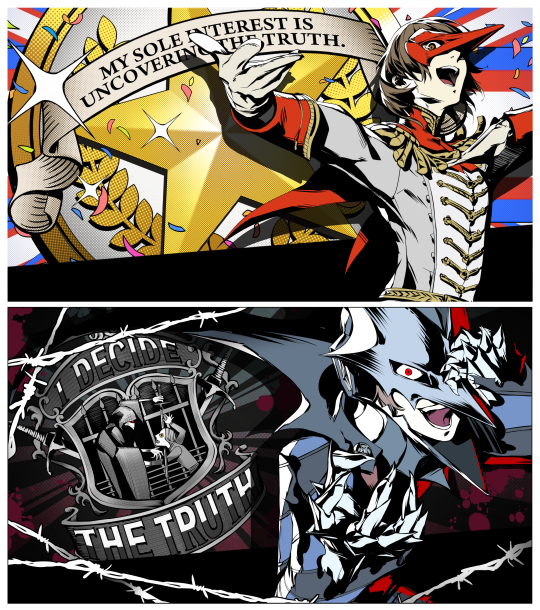
When the Phantom Thieves infiltrate the Meta-Verse to confront the Shadow of the corrupt ultra-nationalist politician, Masayoshi Shido, who’s palace takes the form of a gigantic yacht sailing through the ruins of a sunken Japan, they are suddenly confronted by Akechi in the ship’s engine room. Having just betrayed the team during the previous arc, Akechi is revealed to not only be the true culprit behind the mysterious wave of mental shutdowns & psychotic breakdowns (which included the deaths of two Phantom Thieves’ member’s parents, Futaba Sakura’s mother Wakaba Isshiki & Haru Okumura’s father Kunikazu Okumura respectively…) that have occurred throughout the game’s narrative as part of Shido’s conspiracy to get elected as Prime Minister, but that he is also Shido’s illegitimate child. Essentially, Akechi was the product of a dubious affair between Shido and a sex worker whom the former later discarded when he discovered that she was pregnant, driving her to depression and suicide shortly after Akechi's birth. Akechi spent his entire childhood being passed around as a “problem child” between various foster homes (highlighting Japan’s problems with how the country treats its orphaned children) before later being granted the power of a "wildcard" persona-user, as well as knowledge about the existence of the Meta-Verse by the false god of control, Yaldabaoth.
While Akechi was a societal outcast similar to the members of the Phantom Thieves, he took the wrong message from his experiences. Akechi misguidedly believes that the only way to truly oppose the status quo that looked down upon him is to not only become a part of it (i.e. caring only about his good grades & celebrity status) but to destroy everything that he hates by reducing himself to Shido's right-hand assassin in the Meta-Verse, perpetuating mental shutdowns & psychotic breakdowns on Shido’s political enemies simply to get some semblance of recognition & validation from his abusive father before exacting revenge on him (whilst exploiting his "ace-detective" celebrity status to "solve" the crimes that he himself committed).

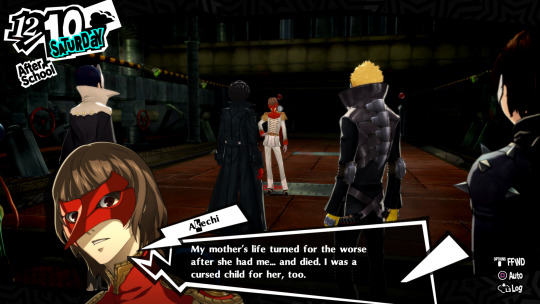
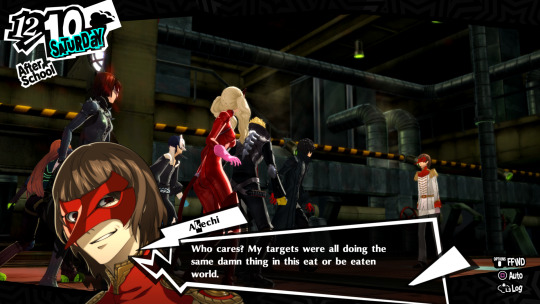
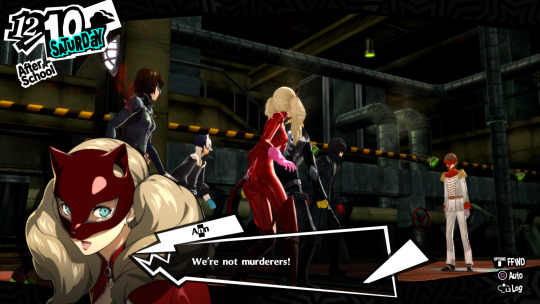

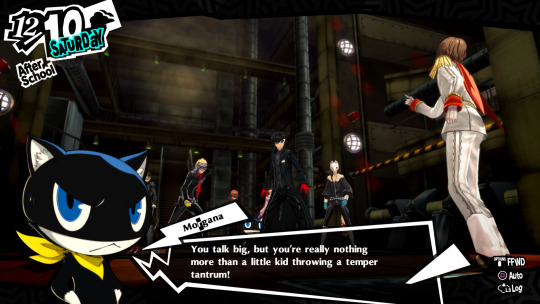
Essentially, once Shido finally became prime minister Akechi planned to whisper the truth about being the former’s illegitimate child, telling Shido that he was only able to get where he was due to the son he abandoned and labeled as a potential “political scandal” before murdering him.
Despite Akechi and the Phantom Thieves' mutual dislike of Shido, the former is so fixated on vengeance that he does not care about the innocent lives he ruins and destroys in the crossfire to satisfy his own personal bloodlust. Instead of legitimately trying to reform society like the Phantom Thieves do, Akechi becomes a pawn of the very same systemic corruption that was responsible for his initial suffering. Akechi cares only about his own hatred & jealousy instead of empathizing with others who were also victimized by society’s ills. This contrast is visually reflected through the juxtaposition between Akechi and the Phantom Thieves’ leader, Joker, when they confront each other in the engine room of Shido’s yacht. While Joker is portrayed as standing strong alongside his teammates & friends, Akechi stands alone in the opposite end of the room, confused & angry. While there is a part of Akechi that regrets his horrible actions and even recognizes the potential for him & Joker to be friends due to their similar backgrounds, he's too far gone into his obsessive vendetta against Shido that he refuses to turn back and now desires to kill the Phantom Thieves in a misguided attempt to ease his internal conflict.
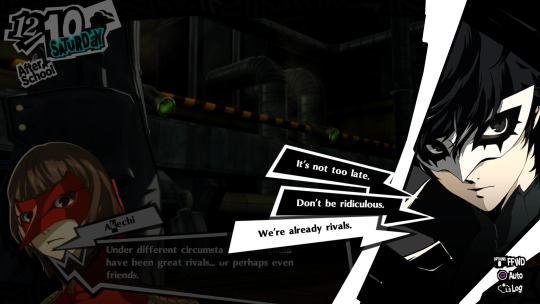

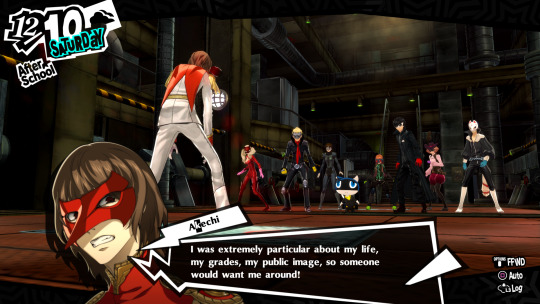

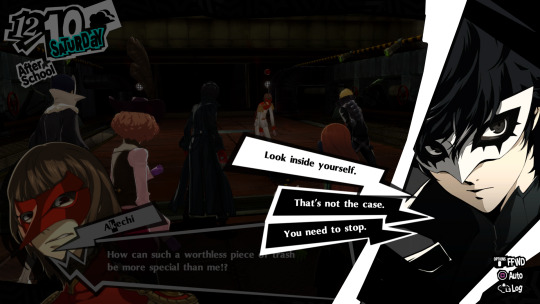
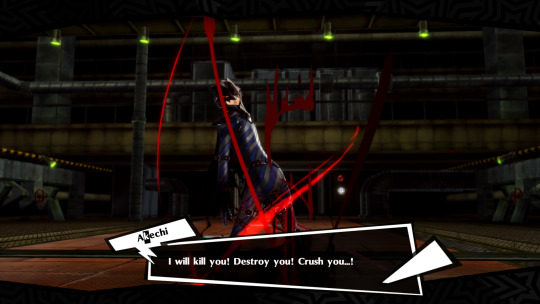
During the boss fight with Akechi in Shido's Palace, the detective prince repeatedly dismisses the Phantom Thieves' efforts to appeal to his common senses, believing that concepts like friendship and teamwork are foolish "cliched bullish*t... in this eat or be eaten world."
While this attitude of Akechi's might seem unrealistically cartoonish on the surface, it actually makes sense when considering his background of being unfairly labeled as a "throw-away child" by Japan's foster care institutions. YouTuber LadyVirgilia goes into far greater detail about this in her excellent The Truth About Goro Akechi analysis video. There, she states that an overwhelming number of Japanese orphans are incapable of being legally adopted due to impoverished parents voluntarily relinquishing them from their care while still maintaining legal guardianship over them. Additionally, LadyVirgilia discusses how violent hierarchical power structures often form among the children within these foster homes, with younger orphans sadly being subject to bullying & abuse by their older peers.
While these facts are not explicitly stated about Akechi's backstory within P5 Royal itself, they can easily be heavily inferred due to the game's heavy emphasis on exploring themes related to Japanese sociocultural issues. It’s implied that the institutional failings of Japan's foster care system (combined with Shido's abandonment of his son while he was still in the womb), ultimately contributed to the development of Akechi's warped perception of the rest of the world. Due to being dismissed as a "throw-away child" and being forced to grow up in an institution that is unfortunately subject to high rates of systemic abuse & neglect, Akechi spent his entire life feeling unwanted & loved. Ideals such as friendship & companionship became foreign and unrealistic concepts to him due to having experienced nothing but society's cold & uncaring apathy.
Essentially, Akechi became deeply jealous & hateful toward the rest of the world, misguidedly compelling him to want to prove his superiority over the rest of society by manufacturing his status as "the celebrity ace-detective and honors student who ultimately brought down Shido." But when Akechi encounters the Phantom Thieves and befriends their leader Joker, he begins to experience his first genuine bond of companionship. Despite developing a legitimate appreciation towards Joker, Akechi is simultaneously confused & unable to fully process these newfound feelings. Akechi becomes envious of Joker's ability to rise above his similar status as a societal outcast by befriending & protecting others like himself. Consequently, Akechi projects his own failings & inability to legitimately rise above his tragic upbringing beyond his false celebrity status onto Joker & the Phantom Thieves, cruely dismissing them as "the trash of society" and blaming them for interfering with his revenge plot against Shido. This empty & hollow existence that Akechi chooses to live is further reflected by the sole two personas that he utilizes during his boss fight: Robin Hood, who represents Akechi's false celebrity & justice-abiding gentleman facade, and Loki, who embodies Akechi’s true personality as a deceitful trickster & psychotic murderer.
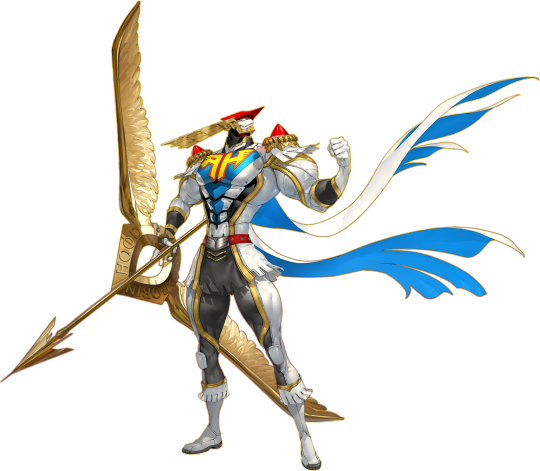
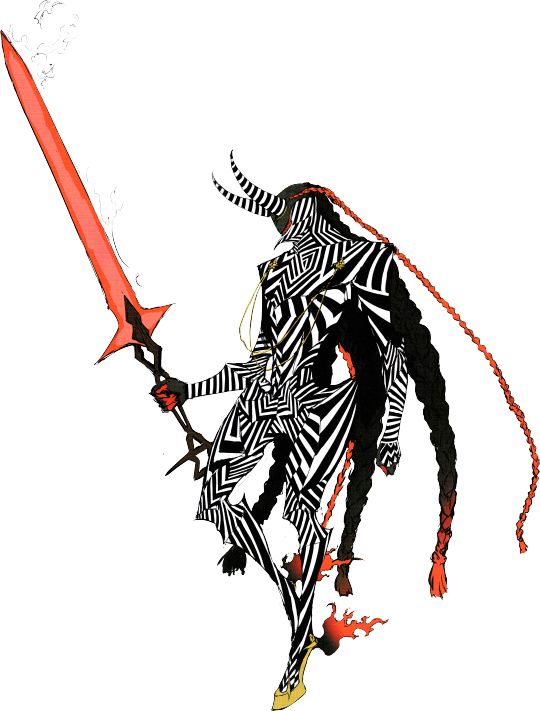
I personally couldn’t help but find all of these elements to be rather interesting & insightful about Akechi’s role as an antagonist/rival to the Phantom Thieves. It honestly highlights the tragic nature of Akechi's situation, since while he had the potential to utilize his deductive knowledge & skills as a "wildcard" Persona-user similar to Joker, he instead allowed himself to be consumed by his own hatred & madness.
The parallels between Akechi & Joker are further evident through the latter also being a victim of Shido’s abuse. Specifically, the corrupt politician wrongfully sued Joker for “assault” when he tried to stop Shido from drunkenly forcing himself upon a woman. In contrast to Akechi however, Joker is motivated by his negative experiences to fight against the unjust status quo that figures like Shido represent to prevent similar abuses of power from ever occurring again to others. Additionally, we also see dualistic parallels between Akechi and other members of the Phantom Thieves, such as Makoto Nijima who similarly previously upheld the misconception that “good grades and following orders are all that truly matters to be a worthwhile member of society.” Whereas Makoto outgrows this mentality by instead choosing to utilize her status as student council president to help her suffering peers rather than for her own academic career, Akechi conversely exploits his intellect as an “ace-detective” to perpetuate societal injustices for his self-centered vendetta against Shido.


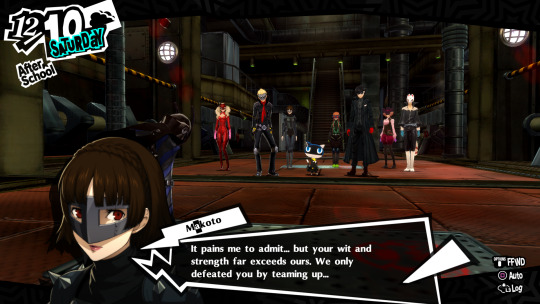
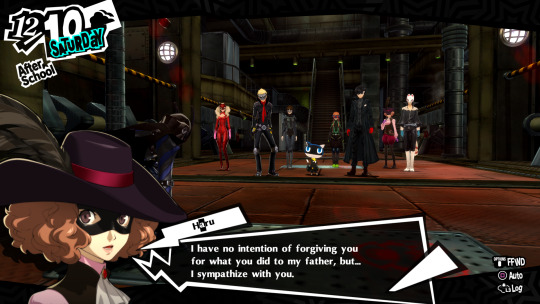
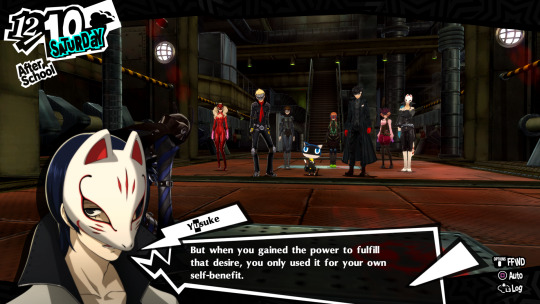

In essence, if the Phantom Thieves embody the potential benefits of rehabilitative justice then Goro Akechi embodies the dangers of retributive justice (aka, revenge). To reference two of my favorite movies, Batman Begins and Star Wars Episode VIII: The Last Jedi, not only is there a strong difference between justice and revenge (one is about altruistic harmony whereas the other is about personal satisfaction), but the most surefire way to victory is by fighting to protect what you love rather than fighting to destroy what you hate...

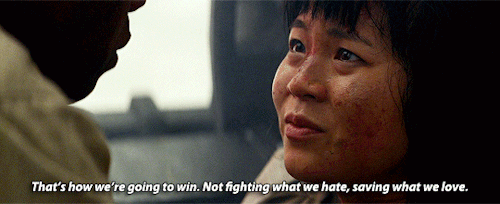
The distinction between justice & revenge is made abundantly clear at the end of Akechi's storyline in the baseline game (i.e. before the Royal exclusive Third Semester new content), where following his defeat at the hands of the Phantom Thieves Akechi is suddenly approached by a cognitive duplicate of himself that dwells within Shido's palace. In addition to the Cognitive Akechi emphasizing the futility of Akechi's quest for acknowledgment & vengeance against Shido by revealing that the latter always intended to dispose of his right-hand assassin once he was elected prime minister, the cognitive duplicate also reveals the true depths of Shido's depravity when he states that he only ever viewed Akechi as a puppet to fulfill his own ambitions. While it is true that Akechi was so obsessed with revenge that he allowed himself to become a pawn of the corrupt status quo, it is exceptionally cruel to learn that this is how Shido has always viewed his own son (which is further punctuated by Shido later revealing to the Phantom Thieves that he secretly always suspected that Akechi was his illegitimate child due to how much he reminded him of his mother). It is this revelation in particular that allows the Phantom Thieves to better empathize with Akechi's tragic upbringing & circumstances. Even though they still seek to hold Akechi accountable for the murders that he committed at Shido's behest, the Phantom Thieves simultaneously recognize that in a sense, Akechi was also a victim of both Shido's cruelty and the systemic injustices of larger Japanese society.
This effectively culminates in the bittersweet resolution to Akechi's storyline in the base Persona 5 game. When the Cognitive Akechi duplicate offers his real-world counterpart one last chance to "redeem" himself in Shido's eyes by killing the Phantom Thieves in his stead, Akechi for the first time in his life decides to be his own person instead of being defined by the labels Shido and society had imposed upon him since birth. Choosing to no longer be a puppet of Shido's corrupt machinations, Akechi rejects his cognitive duplicate's hollow offer by instead turning his gun on the duplicate and his Shadow minions before sealing the engine room's watertight doors between himself and the Phantom Thieves. At the very end, Akechi was finally able to acknowledge that his desire for false appreciation from both his abusive father and larger society was ultimately worthless. Akechi ultimately sacrifices himself to allow the Phantom Thieves to escape, recognizing their true justice while entrusting them to do what he was incapable of by holding Shido accountable for his crimes & reforming society.
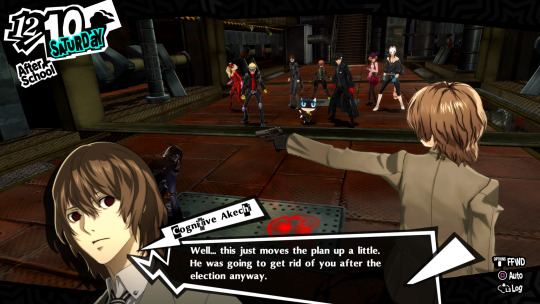

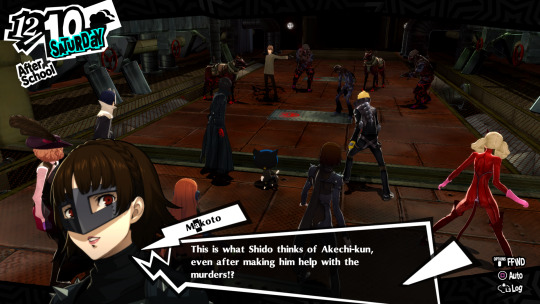
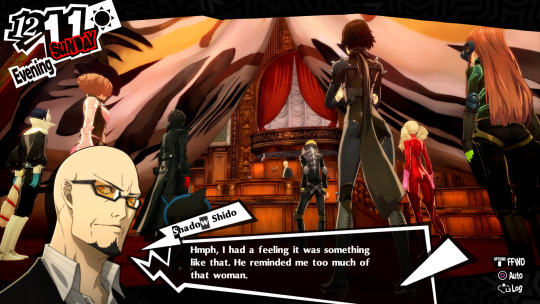
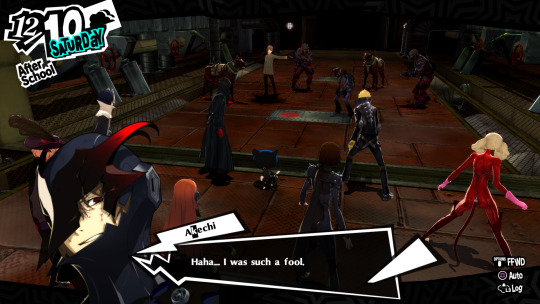
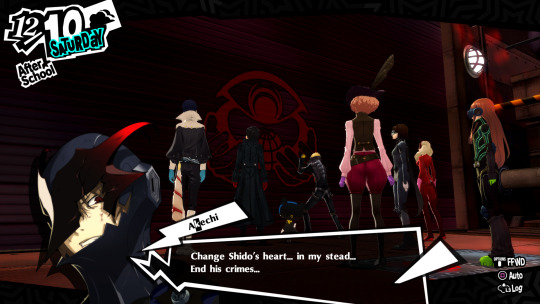
From a certain point of view, one could argue that the Phantom Thieves indirectly inspired a change of heart in Akechi by proving to him the validity of their sense of justice.
Overall, while I was initially indifferent towards Goro Akechi at the start of my playthrough of Persona 5 (and even outright skeptical & suspicious of his motives given his vocal opposition to the Phantom Thieves), by the time I got to his boss battle in Shido's palace I ended gained a deeper understanding and appreciation for what the developers at Atlus were attempting to convey with his character. Akechi effectively functions as both a cautionary tale about the dangers of allowing oneself to be consumed with thoughts of revenge, as well as a dark parallel to the Phantom Thieves who seek to legitimately reform society for altruistic rather than self-centered reasons. It was these elements that ultimately elevated Akechi into becoming one of my personal favorite members of P5's cast (right behind Makoto, Futaba & Ann...) from both a narrative and character writing perspective (especially with the Royal edition's overhauled confidant line for Akechi, which better fleshes out the latter's rivalry with Joker, and the player now has to progress manually instead of it being automatic)! And I am definitely curious to see how Royal's exclusive "Third Semester" content further fleshes out Akechi's character since I'm aware that he plays a major role in the new story content.
#mini essay#persona#persona 5 royal#p5 royal#persona 5#goro akechi#crow#black mask#robin hood#loki#masayoshi shido#phantom thieves#p5 joker#p5 protagonist#ren amamiya#makoto niijima#ann takamaki#ryuji sakamoto#morgana#yusuke kitagawa#futaba sakura#haru okumura#batman begins#the last jedi#justice vs revenge#rehabilitative justice#atlus games#video games#Youtube
182 notes
·
View notes
Note
serious question but do you personally believe there is a way to approach psychiatry in a way that uplifts and upholds patient autonomy and wellness or is the entire trade essentially fucked haha. Btw this is an ask coming from a 3rd year med student—with a background of severe mental illness—who is considering a residency in psychiatry after receiving life-saving care in high school pertaining to said conditions. (I have peers who have been involuntarily hospitalized and treated horribly in psych wards, with approaches i patently disagree with, but was lucky not to experience. I don’t like modern american medicine’s approach to mental illness; “throw pills” at it to “make it go away” ie. a problem of overprescribing, inadequate and non-holistic approach to mental health, and i feel a lot of that can be attributed to the capitalistic framework. I also def agree with you that so much of what can be considered normal human responses to traumatic events/normal human suffering can be unnecessarily pathologized—a great example being the whole “chemical imbalances in the brain is the ONLY reason why im like this” argument that ive unfortunately fallen hard for when i was younger and am still currently dismantling within myself…and like dont even get me started on this field’s history of demonizing POC, women, LGBT, etc). Like i deeply love my psych rotations so far, and i utterly feel in my gut that this is the manner in which i would like to help people—a lot of whom are just like me—but im wondering if there is a way to reconcile these aspects in a way that one can feel morally okay participating within such an imperfect system, in ur opinion… ngghhhhhh i just want to be a good doctor to my patients…
(ps i love all ur writing and analysis on succession!! big fan mwah <333)
i don't mean to sound unduly pissy at you, specifically, but i do have to say: every single time i've talked about antipsych or broader criticism of medicine on this website, i immediately get a wave of responses like this, from doctors/nurses/psychs/students of the above, asking me to, like, reassure them that they're not doing something immoral or un-communist or whatever by having or pursuing these jobs. and it's honestly frustrating. why is it that these conversations get re-framed around this particular line of inquiry and medical ego-soothing? why is it that when i say "the medical encounter is not structured to protect patient autonomy or well-being," so many people hear something more along the lines of "doctors are mean and i wish they were nicer"? why is it that it's impossible to discuss the philosophical and structural violence of academic and clinical medicine without it becoming a referendum on the individual morality of doctors?
i'm choosing to read you in good faith because i think it's possible to re-re-frame this line of questioning to demonstrate to you the sorts of critiques and inquiries i find more interesting and more conducive to patient autonomy and liberation. so, let me pick apart a few lines of this ask.
"is the entire trade essentially fucked?"
if you're thinking of trying to 'reform' the project of medical psychology within existing infrastructures and institutions, then yeah, it's fucked. if you're still assuming that affective distress can only be 'treated' within this medical apparatus (despite, again, no psychiatric dx satisfying any pathologist's understanding of a 'disease' ie an aberration from 'normal' physiological functioning) then you're not challenging the things that actually make psychiatry violent. you're simply fantasising about making the violence nicer.
"I don’t like modern american medicine’s approach to mental illness; “throw pills” at it to “make it go away” ie. a problem of overprescribing, inadequate and non-holistic approach to mental health, and i feel a lot of that can be attributed to the capitalistic framework."
i hate when i talk about psychotropic drugs being marketed to patients using lies like the chemical imbalance myth, and then pushed on patients—including through outright force—by psychiatrists, and the discussion gets re-framed as one about 'overprescribing'. my problem is not with people taking drugs. i am, in fact, so pro-drugs that i think even the ones administered in a clinical setting sometimes have value. my issue is with, again, the provision of misleading or outright false information, the use of force and coercion to put patients on such drugs in order to force social conformity and employability, and the general model of medicine and medical psychology that assumes patients ought to be passive recipients of medical enlightenment rather than active participants in their own treatment who are given the agency to decide when and how to engage with any form of curative or meliorative intervention.
'holistic' medicine and psychiatry do not solve this problem! they are not a paradigm shift because they continue to locate expertise and epistemological authority with the credentialed physician, and to position patients as too sick, stupid, or helpless to do anything but receive and comply with the medical interventions. there are certainly psychotropic drugs that are demonstrably more harmful than others (antipsychotics, for example), and some that are demonstrably prescribed to patients who do not benefit from them and are even harmed by them. conversely, there are certainly forms of intervention besides pharmaceuticals that people may find helpful. but my general critique here is aimed less at haggling over specific methods of intervention, and more at the ideological and philosophical tenets of medicine that cause any interventions to be imposed by force or coercion on patients, then framed as being 'for their own good'. were suffering people given the information and autonomy to actually choose whether and how to engage in any kind of intervention, some might still choose drugs! my position here is not one of moralising drugs, but making the act of taking them one that is freely chosen and available as an option without relying on physician determination of a patient's interests over their own assessment of their needs and wants.
"so much of what can be considered normal human responses to traumatic events/normal human suffering can be unnecessarily pathologized"
true, but don't misunderstand me as saying that drugs or any other form of intervention should be forcibly withheld from those who do want them and are made fully aware of what risks and harms seeking them could entail. again, this would still be an authoritarian model; my critique is aimed at increasing patient autonomy, not at creating equally authoritarian and empowered doctors who just have slightly different treatment philosophies.
"dont even get me started on this field’s history of demonizing POC, women, LGBT, etc"
ok, framing this as "demonisation" tells me that you're not understanding that, again, this is a systemic and structural critique. it is certainly true that a great many doctors currently are, and have historically have been, outright racist, trans/misogynist, ableist, and so on. framing this as a problem of a well-intentioned discipline being corrupted by some assholes is getting it backwards. medicine attracts prejudiced people, not to mention strengthens and promotes these prejudices in its entire training and practice infrastructures, because of its underlying philosophical orientation toward enforcing 'normality' as defined by 18th-century statistics and 19th-century human sciences that explicitly place white, cis, able-bodied european men as the normal ideal that everyone else is inferior to or failing to live up to. doctors who really nicely tell you that you're too fat are still using bmi charts that come from the statistical anthropometry of adolphe quételet and the flawed actuarial calculations of metlife insurance. doctors who really nicely deny you access to transition surgery are still operating under a paradigm that gives the practitioner authority over expressions and embodiments of gender. the issue isn't 'demonisation', it's that medicine and psychiatry explicitly attempt to render judgments about who and what is 'normal' and therefore socially 'healthy', and enforce those standards on patients. this is not a promotion of patient well-being, but of social conformity.
"i deeply love my psych rotations so far, and i utterly feel in my gut that this is the manner in which i would like to help people"
let me ask you a few questions. you say that you like your psych rotations... but how do your patients feel about them? is their autonomy protected? are they in treatment by free choice, and free to leave any time they wish? are they treated as human beings with full self-determination? if you witnessed a situation in which a patient was coerced or forced into a certain treatment, or in which you were not sure whether they were consenting with full knowledge or freedom, would you feel empowered to intervene? or would doing so threaten your career by exposing you to anger and retaliation from your higher-ups? what higher-ups will you be exposed to as a resident, and then as a practicing physician? could you practice in a way that committed fully, 100%, to patient autonomy if you were working at someone else's practice, or in a hospital or clinic? could you, according to current medical guidelines, even if you had your own practice?
when you say "this is the manner in which i would like to help people", what do you mean by "this"? can you define your philosophy of treatment, and the relationship and power dynamic you want to have with any future patients? is it one in which you hold authority over them and see yourself as determining what's in their 'best interests', even over their own expressed wishes? have you connected with patient advocates, psych survivors (other than your friends), and radical psychiatrists and anti-psychiatrists who may espouse heterodox treatment philosophies that you could consider? do you think such philosophies are sufficient for protecting patient autonomy and well-being, or are they still models that position the physician's judgment and authority over that of the patient?
"im wondering if there is a way to reconcile these aspects in a way that one can feel morally okay participating within such an imperfect system"
and here is the crux of the problem with this entire ask. you are wondering how to sleep at night, if you are participating in a career you find morally distasteful. where, though, do your patients enter into that equation? do you worry about how they sleep at night, after having interacted with a system of social violence that may very well have traumatised them under the guise of providing help? why does your own guilty conscience worry you more than violations of your patients' bodies, minds, and basic self-determination?
i can't tell you whether your career path is morally acceptable to you. i don't think this type of guilt or self-flagellation is fruitful and i don't think it helps protect patients. i don't, frankly, have a handy roadmap sitting around for creating a new system of medicine and health care that rests on patient autonomy. affective distress is real, and is not something we should have to bear alone or with the risk of having violence inflicted upon us. what you need to ask yourself is: how does the medical model and establishment serve people experiencing such distress? how does it perpetuate violence against them? and how do you see yourself countering, or perpetuating, such violence as someone operating within this discipline? what would it mean to be a 'good' actor within a violent system, if you do indeed believe that such a thing is ontologically possible?
721 notes
·
View notes
Text
To piggyback off of @shunnedmorlock's post here about the relative justification for both the black and green causes, and how the show presents Rhaenyra's cause as sympathetic.
The in-world choice of who to support in an internecine conflict is, for a lot of lords, ultimately going to be based in self-interest rather than legal, ideological or moral justifications. This fandom fixates a lot on who is in the "right," but the houses that throw their support behind Rhaenyra or Aegon mainly do it for self interest or self preservation. Every lord is going to have multiple literal dragons breathing down their necks, many lords are going to be offered enticements from one side or the other, and some will be considering their own personal circumstances and the precedent their choice sets. A great number of the houses seem pretty determined to stay out of the conflict altogether, even several of the houses that pledge their support in theory, wait until the risk of being caught up in a dragon battle has passed to take any action.
For viewers, our reasons for supporting one side or another are different. Strictly speaking, looking at things from a modern framework, no one has a "right" to the throne. Usurpation is not a human rights violation or even a crime by our standards. Imagine fixating on women being unable to own slaves and thinking that a woman fighting for her right to do so is an expression of feminism. Ridiculous! Certainly it is bullshit within an already bullshit system that a woman comes after her brothers in a hereditary monarchy, but in a just system this conflict wouldn't exist in the first place, not because Rhaenyra would automatically be queen, but because Westeros wouldn't have a king or a queen at all. Liberation doesn't start at the top and trickle down, but rather the opposite.
That said, to modern viewers, Rhaenyra's cause is sympathetic because it feels like an injustice. Most of us don't live within a feudal system and do not have the framework to understand why it's not a form of oppression to be denied the throne. We see it more like a presidential race, in which Rhaenyra is the Hillary Clinton who might have defeated Trump in 2016 if not for misogyny, in which even if we didn't particularly like her, we were disgusted by the fact that that man beat a woman who was at worst no different from many of the men who had occupied the seat before her. To the average vaguely liberal American watching the show, it's insane for fans to support Aegon and the greens and clearly you'd only do it for horny or antifeminist reasons. And you see that a bit in even the showrunners' comments on Alicent being a "woman for Trump," how both they and much of the audience fail to fully understand the historical framework, but in a way that's kind of understandable, because while what happens to Rhaenyra might not be injustice, it is unfair.
If you're looking at things from a historical in-world framework, this is a world in which stability takes a higher priority than equality. Inequality is everywhere, completely baked into the system. If you want to bring about gender equality in a feudal monarchy with a large agrarian population, you have to have first the stability necessary for the rise of an urban middle class which allows for more women to move into the trades, you need the printing press for widespread literacy, which means that more women are getting educated, you need movements such as the reformation to challenge the divine right of kings, and you need to reform the political structure so that leadership is not based on birthright in the first place, because that concept inherently reinforces patriarchal norms even in modern countries that allow women to become queens regnant. So making one woman queen is not going to make things better for women across Westeros, but that woman going to war to reclaim her "stolen" birthright could make things a whole lot worse for a pretty much everyone. This is why you see a lot of history nerds on this site going well, yes but Rhaenyra does have the weaker claim because common law was a big deal in the medieval world and her becoming queen is going to lead to long term succession crises due to the circumstances of her children's birth, so the thing to do would be to take the peace deal. Because while on an emotional level you can understand why she doesn't, it's not the choice that prioritizes the good of the realm.
I think on some level Condal understands (and I think GRRM probably hammered this point home) that you can't really grant anyone the moral high ground in a war of succession if you want to approach the issue with any level of nuance; Rhaenys' speech in the previews for S2 seems to indicate as much. The problem with HotD is that it wants to have its cake and eat it too. It wants to say war for the throne bad, but HBO also wants to make up for the way GoT fumbled the ball with Dany and give the people their likeable dragonriding princess triumphant.
Except Rhaenyra isn't triumphant, she is felled by her own Targaryen hubris and belief that nothing could possibly overcome the might of dragons. It's not Aegon that defeats her, truly, it's the people emboldened in various ways to act against Targaryen interests. It's the dragonseeds she hands dragons to who wonder why they have to take orders from a queen or king when they have control of the kingmaking weapons of mass destruction, it's the smallfolk who face down dragons with pitchforks because they've had enough. They've backed themselves into a bit of a corner with what @shunnedmorlock called the "engoodening" of the black faction, but they can turn it around by showing that it's not enough to be nice to your family, you have to actually care about the people and at the very least (the bar is on the floor, it's fuedalism!) not throw them into chaos, famine, and war for no reason. Give us payoff for Rhaenys' dragonpit scene, have Mysaria and Alys Rivers play a role in their sides' downfalls, show how resentment on Dragonstone allows Aegon to infiltrate. And yes, show Rhaenyra losing herself and becoming a worse person, but in ways that the audience can't excuse as justified. This is how you sow the seeds for that actual progressive change that people seem so desperate to find in the dragonshow, you show how the Dance emboldens the regular people who for the first time realize they can slay dragons, dovetailing into the new show, which stars Dunk, a commonborn man from Fleabottom, and Aegon V, the only Targaryen who ever cared about the smallfolk.
Can HBO pull it off? Ehh. But I remain eternally hopeful, against my better judgement.
108 notes
·
View notes
Text
On that note, Buffy and Angel were both great series and I love them both. But they're also profoundly different in ways that I think both complement and contrast one another.
Buffy was a show about growing up. It famously used the vanquishing of evil as a metaphor for the coming of age. The show married its supernatural elements with its teen drama to such a degree that it basically invented the "Supernatural Metaphor".
Angel was a show about adulthood. Angel also married its supernatural elements to its drama, but the troubles Angel faced were things like paying your bills, home ownership, and parenthood.
An iconic moment of Buffy is when her mom suddenly dies, and Buffy has to step into the role of parenting her little sister. Something that neither of them are truly ready for, thrusting her into the unenviable position of both grieving daughter and too-soon responsible adult.
An iconic moment of Angel is when Cordelia has to teach to him that he needs to start charging clients money for his services because they won't be able to keep the lights on if he doesn't. An argument Cordelia wins, in stark contrast to how many other shows would play it. Because the reality is... You gotta pay the rent somehow.
And this contrast carries over into the shows' respective relationships with evil. Buffy is a show about vanquishing evil. The evil of Buffy the Vampire Slayer is concrete and visceral. The world is filled with monsters, and Buffy is charged with the ability to kill them. Any evil force can be fought, can be overcome, can be slain. Buffy needs only to find the means to do so.
Angel is a show about resisting evil, both from within and without. It's the complexity of a broken world, where people are complicated and there are no easy answers. The show lays out its moral philosophy in its second season with the words:
"If there is no great, glorious end to this, if nothing we do matters, then the only thing that matters is what we do. Because that's all there is: What we do. ... Because if there is no bigger meaning, then the smallest act of kindness is the greatest thing in the world."
It's a series about finding forgiveness and understanding within yourself, and learning how to be better tomorrow than you were today. Set in a world where the evil is systemic, where it is embedded in social constructs. Where it can never truly be defeated, but where we can choose to rise above it.
And I think both of these positions have very good things to say. The nihilistic positivity of "The smallest act of kindness is the greatest thing in the world" is a profound guideline for how we should live in a world that's too big and too complex. But sometimes, problems really do just need a stake to the heart. Sometimes it is simple and, y'know, fuck that guy. But other times it's not.
And we see both of their approaches shine in a variety of ways. Buffy ends by pitting Buffy against an Angel-esque force of systemic and undefeatable evil. Something that can never truly be overcome, that cannot be vanquished. Something that Buffy vanquishes anyway, by recognizing the power of collective action to do what individual agency could never.
Buffy vanquishes a force of evil far beyond her by democratizing her power and becoming a single cog of a larger movement.
By contrast, Angel has the healing and reformation of Faith Lehane. The two-parter "Five by Five" and "Sanctuary" in season 1 are, I would say, the point at which Angel's series really finds its identity and truly becomes its own thing.
Faith is a character who, by this point, has locked horns with Buffy multiple times. She's reached the end of her rope, clashing and being vanquished by Buffy one final time in Buffy's own season four before fleeing across series to fight Angel.
A confrontation that turns from a tense battle with the Evil Slayer into a story of healing, regret, and self-improvement. Here, far away from Buffy and from Sunnydale and from the mistakes, Faith is given a safe space to unpack the choices that she's made and figure out who she wants to be.
A story that culminates in confrontation between Buffy and Angel over Faith, as Buffy comes looking for some honestly well-deserved violent catharsis only for Angel to have to tell her, "This is my show, this is how I handle my storylines, and you're not a part of it. Get out." Which is... really the moment when Angel ceases to be a Buffy supporting character spinning off and comes into his own as the lead of his own series, with his own ideas and stories to tell.
The collective vanquishing of the First Evil is a story that simply would not make sense to tell in Angel. And, by the same token, the healing and restoration of Faith Lehane is a story that simply couldn't fit into Buffy, with its more black-and-white perspective. There shows have very different perspectives, and neither of them are really right. But together, they form a more complete tapestry of living in a complicated world.
36 notes
·
View notes
Text
The last thing any US leftist/progressive/whatever should be doing is undermining our political and civic institutions. To explain why, let's talk for a moment about revolution.
I see people talking about a revolution as though it's a solution. It's not. A revolution in the US would be a disaster for the left. Just look at the most basic item: guns.
The vast majority of privately owned guns are in the hands of the right.
Most police are thoroughly in the tank for the right.
The military is split. AIUI the officers tend very slightly left, while the enlisted tend more strongly right. Just as importantly, a lot of military members would respect rules and traditions precluding political involvement. At best, some military members or units might support the left, while more would support the right and more still would just stand aside.
That's already bad, but also consider who controls the areas where all of our food is grown. Where oil and metals and other raw materials are produced. Where transport and communication lines run. The right has every military advantage. Financial or technology advantages would count for nothing in that scenario. The left would be confined to a few enclaves on the coasts, isolated and ready to be picked off one by one. This is why the right is itching for a revolution. Don't be on their side in that.
So, back to institutions. The only reason the right hasn't already started a revolution is that either our institutions or respect for them preclude it. That's our only protection. Majority we might be, but we rely on the rules to protect us more like a minority typically would. In particular, institutions like the FBI and the court system - as flawed as they might be - are the only way leaders of the right's insurrection can be brought to justice and taken off the board. The only entity that can do that for the military is the military itself, and I sure don't see a lot of leftists working on that. The capitol and metropolitan police were the ones who kept January 6 from turning into an actual coup, and many of them paid dearly for it. We need the good people that exist in all of those organizations to keep pushing justice and reform, but the general tendency is to demonize them along with everyone else. Not smart.
Every time a leftist repeats "our government can't do anything well" or "our government is part of the problem" tropes, they play directly into the hands of the right. By all means, criticize. Hold accountable. Demand improvement. But don't strike at the institutions themselves, at their reasons for existence. Don't weaken the one wall we have. Unless and until we've spent twenty years or so arming and training the left to reach parity with the right (ain't gonna happen) and implementing reform within the police/military and filling the essential industries with our people (both possible but still unlikely), our institutions as they exist are our best defense against a coup turning this country into the exact opposite of what we want. There are too many people already doing the right's work of sabotage, whether they mean to or not. Please stop.
307 notes
·
View notes
Note
genuine question, cause i think i didn't get the tone of your post about this: do you oppose UIB? i completely understand as a measure it's just a reform that does not change the ownership of the means of production etc etc etc, and if you're seeing people praising it like it would (i haven't seen that as of now) i get the annoyance, but i also think it would make *a lot* of people's lives materially better, particularly disabled people who aren't "disabled enough" to be on benefits as per the state's evaluations. so yes it's just a reform and definitely would not solve the vast majority of issues within capitalist production, but in an imaginary world where there was, idk, a referendum about it, i'd definitely be voting yes
So the point about the UBI post is not as simple as "it doesn't achieve the revolution immediately so it's worthless", it's more nuanced and essentially twofold
The post focuses on the fact that UBI is unfeasable regardless of the economic system, I explained this more on detail here. Capitalist welfare states more often than not force the dependents of said welfare measures to bend to specific demands in order to access said welfare benefits, more often than not leaving them in a state of struggling to survive, and if you argue that things like disability welfare is badly managed/insufficient, do you think something as demanding as universal basic income is going to be handled better? or that if there is no will to improve existing welfare systems, that it will be somehow more realistic to implement UBI?
Communist practice is not about asking for the best way to be exploited, it's about educating the working class in scientific class consciousness to emancipate them, by incising into demands such as UBI. Again, it's not really about being for or against measures like this, it's about leading or attempting to lead the proletariat beyond social demands, trying to show how the only real path is beyond any reform of capitalism. If the proletariat ask for better wages, communists should participate in those demands insofar as they benefit the proletarian class in their path to liberation, but never losing sight of what these reforms actually are, taking those demands to their logical prolongations to expose the limitations of reformism. More synthetically, the short-term goals that predominante the will of the working class do so because of the subjectivity of their class consciousness, and in the exercise of going alongside the proletariat in these demands, and trying to carry that thinking beyond the short and medium term, the objectivization or their consciousness is possible.
Apart from all of this reasoning, that post was vaguing a communist I follow who I saw uncritically and seriously explaining why UBI is perfect
41 notes
·
View notes
Text
The thing is that the four-day work week is, fundamentally, also an education issue, not just a labor rights issue. When you look at it for longer than a string of buzzwords, you cannot miss how deeply entwined the two are. And I don't mean that in a "educate people about the benefits of working less" way.
Because the four-day work week, and other forms of decreasing labor presence and opening up free time, are designed to help our most burned-out work sectors. And yes, many of those are the "lowest skill" jobs (finger quotes featuring heavily in the previous sentence.)
But many of them are also *high* education jobs. We already have difficulty accessing medical care because there aren't enough doctors, and in particular not enough specialist doctors - you might be able to see a general practitioner within the week, but I've had multiple friends who are on waiting lists to see neurologists for six, sometimes eight months. That backlog will only get worse if we push through a four-day work week without consideration for increasing the number of neurologists we have, and the only way to do that is by increasing access to education.
And it's the same story across the board for a lot of our highest-educated - or theoretically highest-educated - professions. Public defenders are underpaid and overrun by their case loads, because law school is $200K and if you have that much in student loans you can't afford to not jump at the highest paying job you can get, and that's not going to be helping Joe Smith with his DUI from a crooked cop. Yes, fixing our justice system's issues would help decrease Amy PubDef's case load - but then there's worker's comp people, medical malpractice people... We need more lawyers who are doing the public good because the ones we have are overworked as it is.
Teachers. Social workers. Therapists. On a systemic level, these jobs are underpaid and overworked, and cutting down to a four-day work week isn't going to decrease the number of people who need them, it's just going to make them have to try and fit five days of work into four to keep up. Unless we can get more of these people into the system, a four-day work week is just shooting them in the foot.
And what is the point of having that extra day off a week, when you can't use it meaningfully to get in to take care of the things you need it for, like seeing a doctor, visiting a lawyer to make a will, going to therapy, and so on without having to schedule one, two, six months in advance?
We need education reform first, or the four-day work week is a pipe dream that will leak suffering all over the people who need it most.
#tldr with nael#but no seriously I never fucking see four day work week people talk about this and it pisses me off#and apparently I just hit a breaking point about it#we need more doctors#that is just like simple fact#and there are more people in the world who WANT to be doctors but CAN'T#because they can't afford it#or they're disabled and the current education system prevents them from doing so#it HAS to start with education
26 notes
·
View notes
Text

Anarchists and Parliamentarianism: Elections and Social Change
There are some who now consider themselves anarchists who tell us, ‘Yes, anarchy is our goal, but we are nowhere near achieving it and have to think about winning desperately needed reforms. That means campaigning for politicians, even running for office ourselves, so that laws can be passed in the interest of the working class.’
There are several problems with this. First, it is important to clarify that anarchism not only entails a belief in the ideal of anarchy – of a society without domination, the State, capitalism, etc. – but a method and theory of social change, based on a specific analysis of existing social relations, processes, and institutions.
Any communist, even the most enthusiastic champion of state power (held in the hands of ‘communists’, of course), can claim the abolition of capitalism and the State as their ‘ultimate goal’. They may even truly believe that their authoritarian tactics are the only ones capable of achieving it. Marx himself conceded that the ideal of anarchy was consistent with his vision of communism, though he advocated electoral politics and some form of ‘transitional revolutionary state’ as the means for doing so. It is important to reiterate, therefore, that what really distinguishes anarchism is not simply the goal, but rather our insistence on a necessary unity between means and ends; of the need to act outside of and against the State, rather than through it.
Equally mistaken is the idea that such a view is only relevant when revolution seems imminent, and that, in the meantime, we should directly involve ourselves in the politics of electoral campaigns, parliaments, and legislation, as these are “the only way to achieve reforms”.
Anarchists reject this understanding of how social change – even reformist social change – occurs. Changes in governments and their policies are driven by the shifting needs of the State and capital, within parameters established by the existing balance of class forces. Reforms are not the product of good or bad ideas, politicians, or legislation, but are, instead, the result of the State serving the best interests of capitalism as a system. Where there is sustained pressure from below, directed against bosses and governments, the ruling class must adjust to the threat posed to profitability and stability. Where naked force is not enough to eliminate the danger of organised working class activity, the threat is pacified through concessions and recuperation.
Electoral and parliamentary victories (including referendums and constituent assemblies) are often touted as flawed, but necessary, culminations of social movement energy into ‘real power’. They should instead be understood as efforts to channel extra-parliamentary activity – the only real power we have – into manageable, legal, and, ultimately, non-threatening forms.
Anyone who seriously examines the historical record will find that it has always been direct struggle, and never legal politics, which has allowed us to achieve reform. As such, anarchists maintain that reform and revolution are the result of the same kind of activity. They cannot be separated, as though one were the natural domain of parliamentary politics, and the other self-organised direct action.
Strikes, sabotage, blockades, civil (and uncivil) disobedience, riots, insurrection: these are not only the tools of revolution, but the sole weapons available to us to change things within capitalism itself. They are also a bridge between the two objectives, reform and revolution, as it is in building our capacity to pressure the bosses and governments that we also develop our forces, our ideas, and our confidence to do away with all forms of oppression and exploitation, which we intend to replace with a free, socialist society.
Electoral campaigns, the day-to-day work of parliamentary bureaucracy, and the exercise of state power are all specific forms of activity which, due to their very nature, distract and pacify workers, diverting us from self-organisation and class struggle. They enmesh us in authoritarian models of organisation and task those who do manage to reach government with maintaining the interests of an exploitative property-owning class, whose interests (given their control over the economic life of society) the State must inevitably serve, and which any government (if it is to continue existing as a government, with the power to govern society as a privileged elite) must always reproduce.
Anarchists believe these tactics necessarily alter the behaviour of those who take part in them, whatever their personal beliefs or intentions. This is not a question of corruption, or betrayal, but rather systemic imperatives and institutional logics which can not be overcome by even the most radical of politicians.
Which brings us back to that principle at the very heart of anarchism: the necessary unity between means and ends. As I have said, this requires that we refuse participation in electoral politics, or the formation of any ‘new’ State, whatever its ‘revolutionary’ pretensions. However, it also means that we must organise, make decisions, and act in ways which both reflect the ideal we are working to establish and directly alter the balance of class forces, without deference to institutions or leaders of any kind. Our organisations must be freely constructed from the rank-and-file upward and our strategic orientation must be toward direct action against the bosses and government.
As a final comment, it is worth noting that this institutional analysis of the State extends to the local or municipal level, and that anarchism can’t be reconciled with such experiments in ‘direct’ or ‘town hall democracy’. Murray Bookchin’s eventual break with anarchism in the late 1990s seems to have been forgotten by ‘anarchists’ who now seek inspiration from his theory of municipalism.[20] His followers mistakenly echo the municipalist belief that the structural imperatives of the capitalist state disappear the closer a governing body is to the population. Unfortunately for the municipalists, the organisational forms of parliamentary politics, the ways in which they alter us as people, and their function within capitalist society, all remain the same at the level of a city council. A localist state-socialism is still state-socialism.
[1] For a critique of what is often mistaken for ‘mutual aid’, see the article ‘Socialism is not charity: why we’re against “mutual aid”’ published by the collective Black Flag Sydney in their magazine Mutiny (available at: blackflagsydney.com). For another examination of how mutual aid relates to Kropotkin’s revolutionary anarchism, see: Gus Breslauer’s ‘Mutual Aid: A Factor of Liberalism’ in Regeneration regenerationmag.org
[2] This quote contains additions made to the 1913 original in a 1914 edition published by Freedom. I am quoting from the definitive 2018 edition edited by Iain McKay, and published by AK Press, but have used the extended text (included by McKay in a footnote) to reflect the longer 1914 version. Available here: usa.anarchistlibraries.net
[3] Malatesta, E. 1884. Between Peasants: A Dialogue on Anarchy. Available at: theanarchistlibrary.org. Malatesta puts forward the same position in his series of dialogues titled At the Cafe (1922). In ‘Dialogue 8’ he writes the following exchange: “AMBROGIO: And if the others [the minority] want to make trouble? GIORGIO: Then… we will defend ourselves.” See: theanarchistlibrary.org.
[4] See Mark Bray’s ‘Horizontalism: Anarchism, Power and the State’, published as a chapter in the 2018 collection Anarchism: A Conceptual Approach. Bray’s chapter is available at: blackrosefed.org.
[5] Graeber was also one of the most prominent advocates of the Rojava Revolution, the specifics of which are too complex to examine in detail here. It must be said, however, that his uncritical lauding of a revolution which (all the available evidence indicates) has formed a state, and purposefully maintained class divisions, indicates the same kind of drift in his political thinking. This drift appears to be rooted in a framework which sees a libertarian legitimacy in all outcomes which can (at least plausibly) be said to have been born out of ‘direct’ or ‘assembly-based’ democracy. For a valuable resource on the Rojava Revolution, which describes the movement’s opposition to expropriation and gradual transfer of power from a rudimentary council system (the ‘People’s Council of West Kurdistan’, or MGRK) to a parliamentary one (the ‘Democratic Autonomous Administrations’, or DAAs), see the 2016 book Revolution in Rojava: Democratic Autonomy and Women’s Liberation in Syrian Kurdistan. Available at: theanarchistlibrary.org. This is an important book given it is the most positive account of the revolution in print (the picture painted should be taken with a grain of salt), features an introduction from Graber himself, and yet concedes these crucial points regarding Rojava’s parliamentary system and the leaderships opposition to the socialisation of property.
[6] For an analysis of Spain, see ‘What went wrong for the municipalists in Spain?’ by Peter Gelderloos in Roar magazine: roarmag.org. For a critique of the Corbyn project, including Momentum, see ‘Labour defeat – Thoughts on democratic socialism’ by the Angry Workers of the World collective, based on a chapter from their excellent book Class Power on Zero Hours (2020): www.angryworkers.org.
[7] Fabbri, L. 1921. Dittatura e Rivoluzione. Fabbri’s book has yet to be published in English. The chapter referenced here (‘The Anarchist Concept of the Revolution’) has, however, been translated by João Black, with assistance from myself. It can be read here: theanarchistlibrary.org.
[8] For an introduction to the ideas of dual organisationalism, platformism, and especifismo, see Tommy Lawson’s pamphlet ‘Foundational Concepts of the Specific Anarchist Organisation’, published by Red and Black Notes: www.redblacknotes.com. I also highly recommend Felipe Corrêa’s essays ‘Organizational Issues Within Anarchism’ (2010, Espaço Livre), available here: theanarchistlibrary.org, and ‘Bakunin, Malatesta and the Platform Debate: The question of anarchist political organization’ (2015, Institute for Anarchist Theory and History), co-written with Rafael Viana da Silva, and available here: theanarchistlibrary.org.
[9] This was often sold by governments and union leaders as a sacrifice necessary to resolve the economic crises of the period. It also supposedly offered the movement “a seat at the table”, or a “share in power”. In reality, the crisis was one of profitability, which could only end with the crushing of the labour movement, or a social revolution. By sacrificing the ability to take direct action for an illusory idea of power within the State, the labour movement accepted its own disorganisation and a major defeat. For an excellent study of this process as it occurred within Australia, through the form of ‘The Accord’, see Elizabeth Humphrys’ 2018 book How Labour Built Neoliberalism.
[10] “We have seen that the specific minority must take charge of the initial attack, surprising power and determining a situation of confusion which could put the forces of repression into difficulty and make the exploited masses reflect upon whether to intervene or not.” – Bonanno, A. M. 1982. ‘Why Insurrection?’. Insurrection. Available at: theanarchistlibrary.org
[11] For a comradely critique of the CHAZ (or ‘CHOP’) project, see the analysis written by Black Rose Anarchist Federation members Glimmers of Hope, Failures of the Left: blackrosefed.org. Perhaps even more interesting is the critical account from the CrimethInc collective, The Cop-Free Zone: Reflections from Experiments in Autonomy around the US: crimethinc.com. Indeed, CrimethInc appears to be a collective in a period of transition. Once the favourite of dumpster-divers and purveyors of ‘riot porn’, they have increasingly become a reasonably reliable source for breaking news of working class uprisings around the world. They have even begun to engage more seriously with classical mass-anarchist history and theory, as in their great 2019 essay Against the Logic of the Guillotine: crimethinc.com.
[12] Idris Robinson’s essay ‘How It Might Should Be Done’ (originally a talk; later published by Ill Will Editions) is justly scathing on this phenomenon: There’s a lot of talk about how to end racism, especially within corporate and academic circles. We saw how to end racism in the streets the first weeks after George Floyd was murdered. “It was only after the uprising began to slow down and exhaust itself that the gravediggers and vampires of the revolution began to reinstate racial lines and impose a new order on the uprising. The most subtle version of this comes from the activists themselves. Our worst enemies are always closest to us. You’ve all been in these marches, these ridiculous marches, where it’s, “white people to the front, black people to the center”—this is just another way of reimposing these lines in a more sophisticated way. What we should be aiming for is what we saw in the first days, when these very boundaries began to dissolve.” Robinson’s essay can be read here: illwill.com. Another essay by Shemon Salam, ‘The Rise of Black Counter-Insurgency’ (also published by Ill Will) touches on similar issues and is likewise recommended: illwill.com.
[13] One can’t help but recall the uncritical enthusiasm demonstrated by many insurrectionary anarchists during the 2014 Euromaidan uprising in Ukraine. Not only was there little interest in the political character of the struggle, but even in the influential presence of far-right elements. People were in the streets, in violent conflict with the brutality of the State… Molotovs were being thrown! ‘What else is there to a revolution?’ This is how an ‘anarchist’ thinks when they are not concerned with class struggle and the need to transform the structures of production and distribution.
[14] Salam, S. Breonna Taylor and the Limits of Riots’. Spirit of May 28. Available at: www.sm28.org. Salam’s argument recalls similar points made by Malatesta. See, for instance, his articles ‘The Products of Soil and Industry: An Anarchist Concern’ (El Productor, 1891, available at: theanarchistlibrary.org) and ‘On ‘Anarchist Revisionism’’ (Pensiero e Volontà, 1924, available at: theanarchistlibrary.org).
[15] Leoni, T. 2019. Sur les Gilets Jaunes. Translation is from Gilles Dauvé’s equally important piece for troploin, ‘Yellow, Red, Tricolour, or: Class & People’. For Dauvé’s essay see: www.troploin.fr. Leoni’s work is available in French here: ddt21.noblogs.org
[16] All quotes from Bonanno, A. M. 1977. Armed Joy. Available here: theanarchistlibrary.org.
[17] This is true whether we are concerned with unions or (Bonanno cannot avoid this!) ‘federations of production nuclei’.
[18] All quotes from Bonanno A. M. 1975. ‘A Critique of Syndicalist Methods’. Anarchismo. Available at: archive.elephanteditions.net.
[19] Or ‘synthesis organisation’ as Bonanno confusingly calls it. Typically, synthesis organisation refers to an approach in which anarchists of all types work together, without a specific shared analysis, programme, or strategic approach.
[20] For a good critique of Bookchin’s break with anarchism, see Iain McKay’s review of The Next Revolution (2015): robertgraham.wordpress.com.
#anarchist movement#autonomous zones#class struggle#criticism and critique#dual power#Elections#horizontality#insurrection#Notes#organization#Red and Black Notes#riots#social change#autonomy#anarchism#revolution#climate crisis#ecology#climate change#resistance#community building#practical anarchy#practical anarchism#anarchist society#practical#daily posts#communism#anti capitalist#anti capitalism#late stage capitalism
25 notes
·
View notes
Note
So do you like think there's a line between lgb (cis homos) and "queer" people? Because I hate the term queer (for myself), but I have always and will always be for trans rights. L with the T. The argument you make (aro manifesto) makes it seem like the same idea of "well bi people and pan people are different bc pan people are the real 'queer movement' and trans inclusive"...as if cis lgb people don't consider themselves queer or trans inclusive. Just seems like a separation of us and queers, which only divides us more. Like I get people think we are only ever for marriage equality/rights (due to the aids crisis) and also current organizations highlighting only that need, but like stop separating "us" (cis lgb) from you/queers as if we don't have the same goals in mind. I too think we should focus more on other goals as marriage is not the only important thing. We are of the same community, not different.
i'm gonna break this down/define the way i use things so you can understand what i'm talking about, because you have made a lot of assumptions. these aren't like official definitions, because strict definitions just never really quite work in these kinds of conversations, but this is what i generally mean when i use these terms. any identities listed aren't an exhaustive list, they're just what i thought of in the moment.
lgbt+ community: anyone who is lesbian, gay, bi, trans, ace, aro, pan, nonbinary, etc. this is not an established group with a mission, it's just a category of people who identify as not cishetallo.
queer community: a group united by a mission you can read more about the original queer manifesto from 1990 here. queer people are cis, trans, intersex, genderqueer, nonbinary, gnc, straight, gay, lesbian, bi, pan, ace, aro, etc. but that's not what makes them queer, what makes them queer is the goal of collective queer liberation. (some people use queer as an individual identity and want to separate themselves from queer as a political identity and like, i can't stop them, but the fact of the matter is that since the word queer was reclaimed in the 80's it has been inextricably linked to the queer liberation movement, which is inherently political.)
the difference between these two is that lgbt+ is an individual identity whereas queer is a political identity.
there's a lot of ways lgbt+ people might form community that don't include being part of the queer community, and there are many queer people who take the political stance of not identifying as lgbt+ because they consider their queerness to be more than just an individual identity and feel that being categorized under lgbt+ removes the political aspects of their identity. the venn diagram of these two communities is not a circle, but it's also not two completely disconnected circles either. there is overlap, and that includes cis queer lesbians and gays.
lgbt+ advocacy: this is advocacy that is based within the current system. fighting for marriage equality, right to start a family by adopting within the system or using ivf, fighting discrimination in the workplace, etc. all great things to fight for.
queer liberation movement: this movement seeks to dismantle the cisheteropatriarchy entirely. for example, some folks believe that we should be fighting to dismantle the concept of marriage rather than just fight for lgbt+ people to be able to get married under the current system.
neither of these approaches is Objectively Correct, though everyone is going to have their own opinions on what they think the right course of action is. you can think of these two categories as reform vs. abolition. sometimes they overlap, sometimes their ideologies are incompatible.
so when i say that the aromantic manifesto had a fundamental understanding of what the queer community is and what the queer rights movement is, this is what i mean: the manifesto presented the "queer community" and "queer rights" as what i would define as the lgbt+ community and lgbt+ advocacy. based in identity, and prioritizing reform over abolition. so their critiques that the "queer community" and "queer rights movement" only fights for marriage equality seemed bizarre to me, because queer liberation is more likely to fight for the dissolution of the concept of marriage. it's more likely to tackle the concepts of societal norms and what a "normal" relationship looks like and how it functions.
and the thing is, i get a lot of people who get angry at me for "separating" queer people from the rest of the community, but the fact of the matter is that the rest of the community separated itself from us. when i talk about cis lgb people who prioritize assimilation, i'm not talking about Anyone Who Is Cis And LGB, i'm talking about cis people who are lgb who will throw trans women under the bus to maintain a cisnormative view of what a woman is. i'm talking about cis lgb people who think that kink is disgusting and wrong and blame queer kinksters for "making the lgbt community look bad." i'm not talking about identities, i'm talking about actions.
i'm not saying i think any one identity is "more queer" than others, i'm saying that i do not definitionally consider the lgbt+ community and queer community to be the same thing. and tbh, i do get really tired of people who don't identify with the queer community getting pissed off that i don't set my queerness aside to align myself with them if they wouldn't set aside their discomfort with queerness to align with me. if you don't want to align yourself with the queer community, that is entirely your prerogative. but it seems like you think that queer people are the ones creating the separation simply by identifying as queer while you don't, when the problem is that people who don't want to identify with queerness still want access to the same level of community with queer people as if they were in the community, and i'm very sorry but that's just not feasible. we can still fight side by side for our rights, but no, we are not the same community.
120 notes
·
View notes